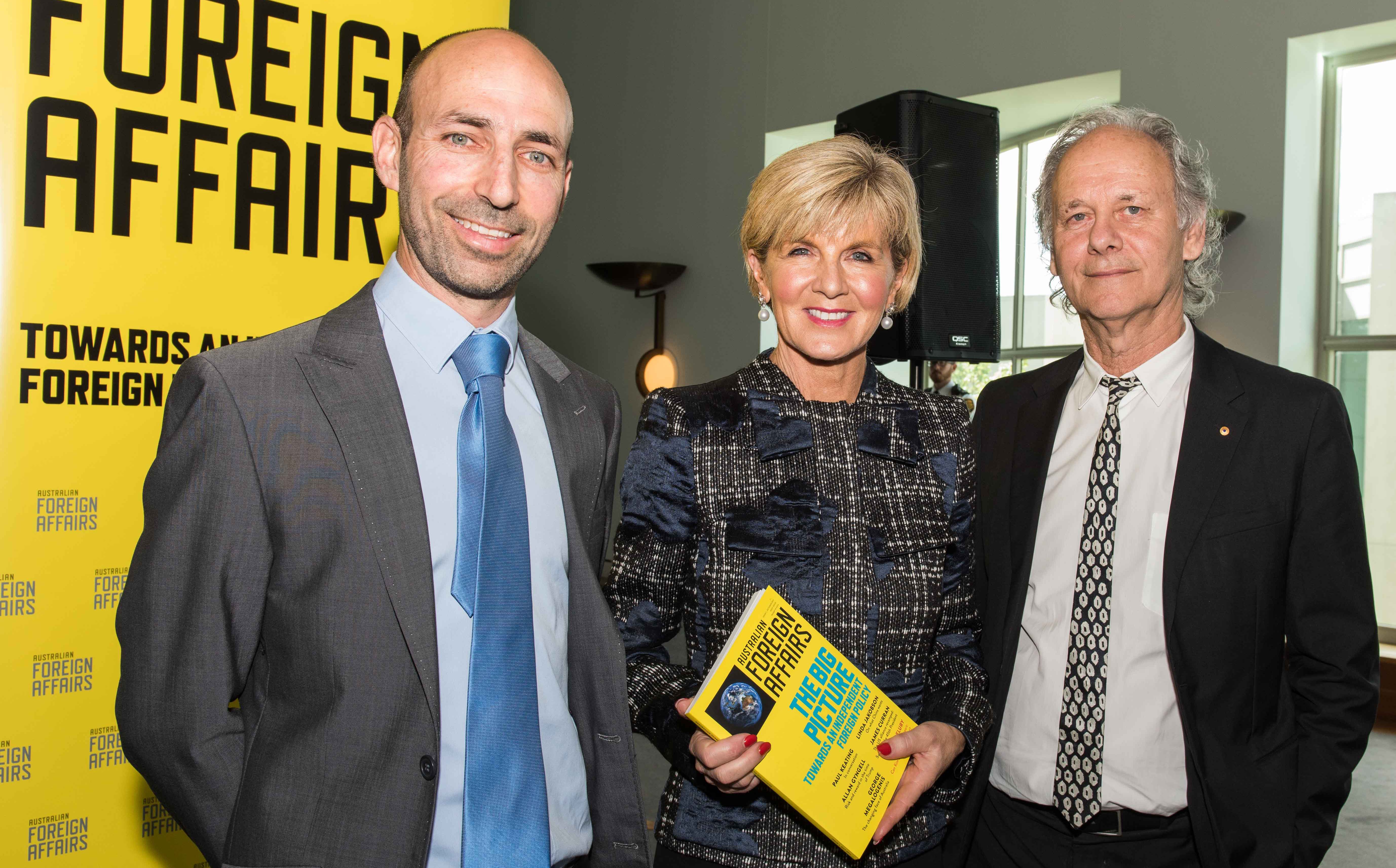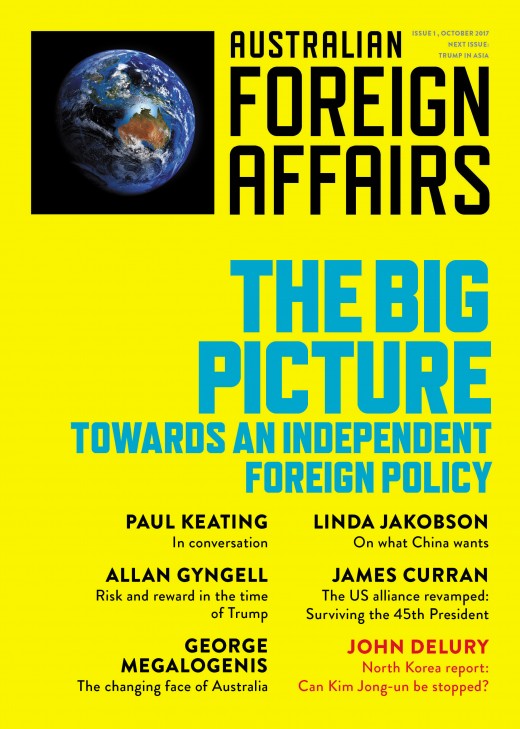News

News > Book Launch
The Hon Julie Bishop MP launches Australian Foreign Affairs
After a moving speech by the Minister for Foreign Affairs, The Hon Julie Bishop MP, Australian Foreign Affairs was launched at Parliament House in Canberra.
You can read the full transcript of Julie Bishop’s speech below.
Jonathan Pearlman, Morry Schwartz, distinguished diplomats, Chancellor of the ANU Gareth Evans – and former Foreign Minister – Mark Dreyfus representing the Opposition, Members of Parliament, authors, ladies and gentlemen all.
In 1946 the United States Chargé d'Affaires to Moscow, George Kennan sent an 8,000 word telegram to the State Department.
Famously known as the ‘long telegram’, it concerned the aggressive nature of foreign policy under Soviet dictator Stalin.
Writing as ‘Mr X’, George Kennan subsequently outlined his thesis in an article for the July 1947 issue of Foreign Affairs, and it was entitled somewhat prosaically, ‘The Sources of Soviet Conduct’.
Kennan’s main thesis was that the major elements of US foreign policy in relation to the Soviet Union had to be a long term, patient, firm but pragmatic containment of Russia’s interventionist tendencies.
Over the following decades, Kennan’s work came to be seen as the best guide, the best explanation of US foreign policy when it came to the Soviet Union.
Now I raise Kennan’s article because it is an example, a wonderful example of the potential influence on world affairs of a succinct article.
Written in an engaging, coherent style, it grappled with one of the major dilemmas of the times and offered a coherent and pragmatic policy response.
It also helped to explain to a generation of Americans why the United States Government took a particular direction during the early years of the Cold War, and it demonstrated the power of ideas, the sheer power of words and how they could influence world affairs and the lives of generations of people.
Now the power of words is not lost on the foreign policy community in the United States. If you log on to the State Department website you'll see some 60 think tanks listed as being those whose work is valued by the US, the State Department and governments around the world.
Of course, this is an elite group amongst a much broader community of think tanks – I think there’s something like 400 foreign policy think tanks in Washington DC alone.
But these think tanks regularly publish journals and articles and generate a debate, a discourse, a dialogue about foreign policy and its impact around the world.
Some of them are almost household names in our part of the world – Foreign Affairs, Foreign Policy, The National Interest, The American Interest, Washington Quarterly, World Affairs, and many, many more.
I believe that Australian Foreign Affairs will be a valuable contribution to debate and discussion here and around the world, for our academics and intellectuals and policy analysts stand with the very best in the international community, and it is important for our commentators, intellectuals, analysts to have a platform to propagate and test their ideas. Hence Australian Foreign Affairs.
There are a distinguished list of contributors from Paul Keating, a former Prime Minister; Allan Gyngell, formerly the head of ONA, in fact a foreign policy adviser to Prime Minister Keating and founder of the Lowy Institute; Linda Jakobson, an expert on all matters China; George Megalogenis, an independent writer and former distinguished member of the Canberra press gallery; James Curren, an historian and expert on the ANZUS alliance; and John Delury who is an expert on the Korean Peninsula.
There are also contributions from distinguished reviewers and commentators on a number of important books and works.
This inaugural issue of Australian Foreign Affairs deals with many of the challenging issues that confront us today in an increasingly contested and volatile and uncertain world – from the impact of the Trump Administration on Australia on our region, from the management of North Korea under the regime of Kin Jong Un, to what it means to have an independent foreign policy, to the transition from Australia as Anglo-Euro to Eurasian, and many more.
These are all questions that Australians need to discuss, need to confront because they go to the very heart of our national interest.
The contributions are all thought-provoking, controversial, provocative in parts, but they draw on such a wide array of disciplines from political science and international politics, to economics, sociology, psychology, and there are sprinklings of anecdotes that brings it all together and brings it to life.
Now I disagree with a number of the propositions put forward but I certainly pay tribute and thank the authors for giving their perspectives, and this is what it's all about – a contest of ideas, debates, disagreements, discussion.
I’m delighted by the timing of this contribution for the Australian Government will shortly release the Australian Foreign Policy White Paper of 2017.
While we can’t predict the future, this White Paper will make a significant contribution to creating a framework for our international engagement for at least the next decade and beyond, setting out and identifying our priorities, our interests, our values and how we will engage in this contested, uncertain world.
One of my tasks as Foreign Minister is to project and protect Australia’s reputation as an open, liberal democracy, committed to freedoms, the rule of law, democratic institutions, and an open, export-oriented market economy that sells its goods and services to the world.
As we enter our 27th consecutive year of uninterrupted economic growth – a feat not accomplished by any other nation at any other time – Australia is an increasingly strong voice on the world stage.
Indeed this will answer Paul Keating’s question, for it will contain an independent foreign policy.
As I travel particularly through our region, Australia is seen as an independent and influential voice – principled yet pragmatic – one of the reason why we've been elected to overwhelmingly to the UN Human Rights Council.
This publication, Australian Foreign Affairs, will add greatly to the debate in this country.
International affairs have never been more important to Australia and the Australian people, and I congratulate the authors, the editors, the publishers on a fine work that will contribute to the betterment of our society.
I have great pleasure in launching Australian Foreign Affairs.



